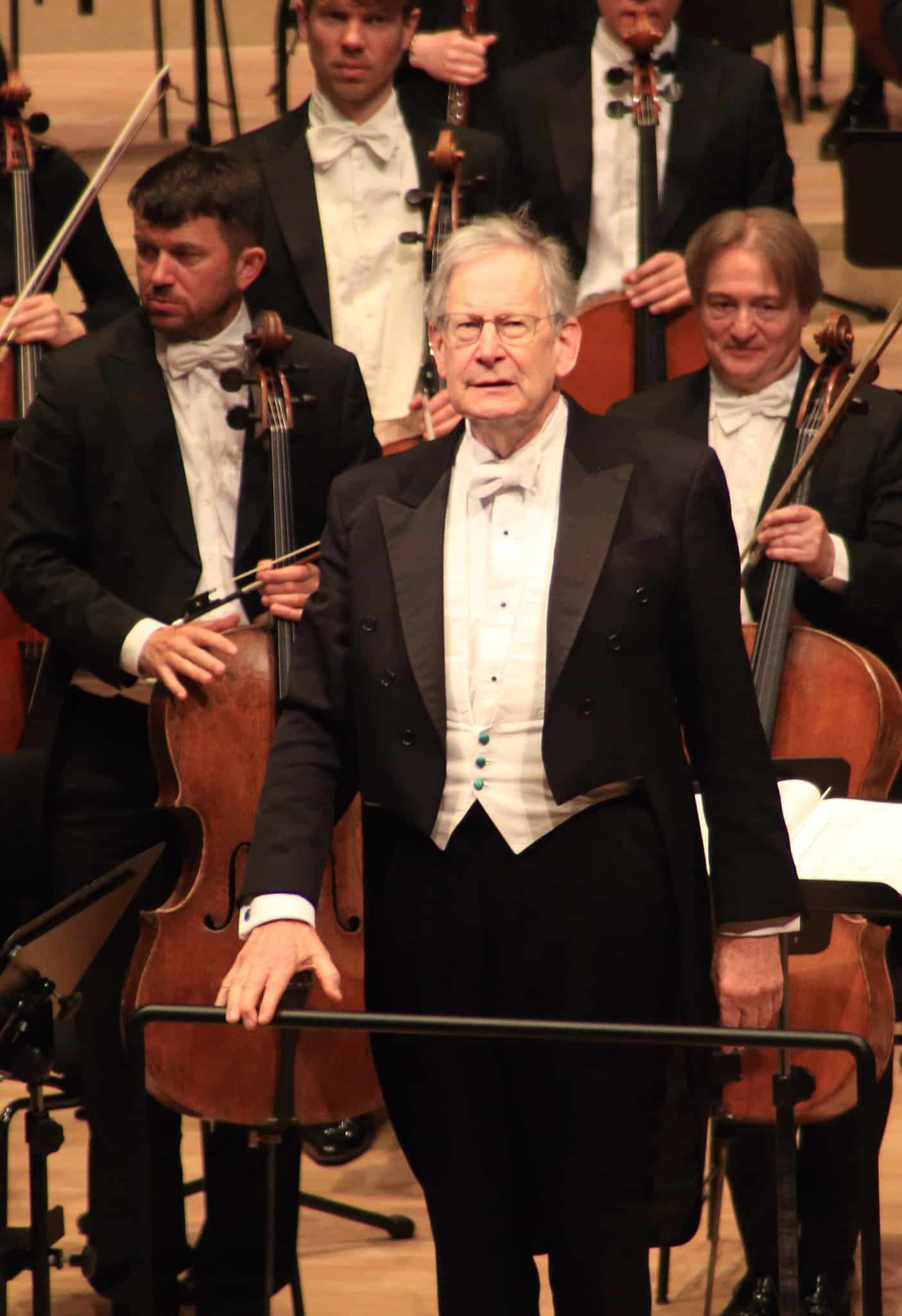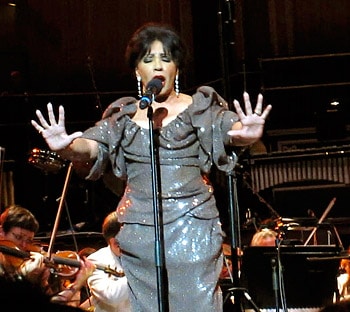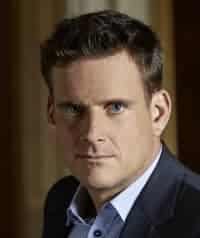Anna Netrebko: ‘We artists shouldn’t meddle in political issues.’ Er, don’t quote me.
main
norman lebrecht
November 29, 2013
The diva gave a joint interview with Placido Domingo to Die Zeit (German text, and not online). Her precondition, issued through her agency, was that she was not to be asked questions about Vladimir Putin. The paper duly reported that.
Here’s a summary of the rest of the interview for Anna-watchers.

During the first part, Domingo does nothing but praise Netrebko.
He first heard her as one of the Flower Maidens in a production of Parsifal conducted by Gergiev.
“She was the jewel of the evening, a diamond!”
He told her after the performance that she should take part in his Operalia competition.
Netrebko: “And I screamed: Never! I’m not the type for competitions. I’ve never taken part in a competition in my life.”
While as opera chief in LA and Washington, he has cast her several times, Il Trovatore is the first time they’ve actually sung together.
Domingo: “And it won’t be the last time. As long as I was a tenor, our repertoire wasn’t compatible. I’m 30 years older than Anna, I was simply too late, something which I’ve always regretted. But now I’m a baritone. I can be Anna’s father on stage. There are lots of father roles….”
Netrebko: “I’d prefer lovers.”
Domingo: “Good, then let’s take Verdi’s Macbeth, he and Lady Macbeth aren’t a particularly nice couple. But exciting. Ever since I heard Anna Netrebko as Manon in LA, she is for me one of the most important singers of all time.”
Netrebko whispers to Domingo: “Placido, you’re talking about me all the time. This is an interview about Il Trovatore.”
Domingo: “Yes, I talk about you. And I’m talking about the calibre of a Maria Callas. And I don’t just mean the voice, but the musical intuition, the acting, your phenomenal stage presence. Just everything.”
Netrebko: “Callas is unparalleled.”
Domingo: “She was unparalleled until you came along.”
Netrebko is equally effusive about Domnigo: “Whether as a tenor or a baritone, it doesn’t matter. Placido’s is the voice of a genius. It is always beautiful, no matter in what repertoire, what language, what age. It is singing at its most perfect. Even if I don’t believe in God, his voice is a gift from above.”
She denies that the opera business is a vipers’ nest (German is Haifischbecken = tank of sharks): “That’s a silly cliche. Why should there be more scheming and plotting, more envy and jealousy than anywhere else?”
Turning to the role of Leonora in Il Trovatore, she says:
“Can I be honest? For me, Leonora is a completely phoney character. I don’t find her credible, not for a second. I don’t believe that someone can love so much that they’d give up their life. That’s total bullshit. I’m a woman of the 21st century. I’m from Russia. And I believe in survival, completely pragmatic. Hence I feel Leonora is an extraordinarily weak person. Manrico is weaker still. Aszuena, the gypsy, simply horrible. Only Luna shows any strength. But Verdi’s music is brilliant. And that is more than enough.”
Towards the very end, she says:
“We artists shouldn’t meddle in political issues.”






I agree with her analysis of Trovatore, except for her comment on Verdi’s music.
I would understand if she COULDN’T meddle, a la Shostakovich, for fear of painful consequences. But SHOULDN’T? No, we absolutely should. If there’s one thing we can usefully do (beyond merely entertaining people), it is to “meddle”, as she puts it.
Yes, we should. But do we? Do we really? Let’s be honest. What do we really do that makes any difference? The western countries we live in are engaged in a lot of really serious and terrible political and economic activities which cause vast misery in many places. Do we really do what we could do to change that? Do you have an iPhone? Or another smartphone? It doesn’t really matter, they are all made by people who live and work under nearly slave-like conditions. As are pretty much all the electronics and most other products that we all use every day. The computers we type on those message here probably, too.
I am not a Christian, but I do kind of like the “cast the first stone thing”.
“usefully” is one hellava strong word, there. “Meddle,” however, is simply appropriate.
Only one who WANTS to meddle, should. Is Van Gogh a lesser artist because he didn’t meddle in politics? It would be absurd to say so. Artists should make art. If they don’t do anything else, that’s perfectly fine. L’art pour l’art is as perfectly valid concept as is ‘engaged’ art. Often, ‘engaged’ art is short-lived, i.e. not art at all, but a political instrument. When times change, it looks silly because it doesn’t transcend its context.
Well, if she can’t meddle in political issues, she can’t very well say that to the press, now can she?
So of course she’ll say she shouldn’t.
That, MWnyc, is a very good point.
Well, Leonora is neither from Russia nor a woman of the 21st century. And performing other characters than herself is Netrebko’s job as an opera singer.
Just imagine Sir Laurence Olivier saying: “I don’t find Hamlet credible. I’m a man of the 20th century.”
Disclaimer: I don’t judge the Trovatore-libretto to be of a Hamlet-like quality either. But Netrebko’s argument is, to put it in her own words, bullshit.
Yes.
But Netrebko DOES perform Leonora, as she is currently doing in Berlin (the production premieres tonight), despite her finding the role silly.
She’s doing her job.
Surely she’s allowed to have an opinion about it, nevertheless,
Don’t really see what’s “bullshit” about that.
The bullshit is this: “I don’t believe that someone can love so much that they’d give up their life. That’s total bullshit.”
The fact Ms. Netrebko (and maybe me and many other people) wouldn’t do so doesn’t mean nobody would. Lots of people in history (and no, I don’t mean ficticious opera characters) did.
And I really wonder how Netrebko will play a credible Leonora if she believes the character is bullshit.
Sorry, but that still doesn’t explain why what she says is “bullshit”.
You concede that you — and probably a lot of other people — would probably not lay down their life out of love.
But you pillory her for saying so.
I think she’s just being honest.
And whether she is a credible Leonora or not remains to be seen.
There are plenty of roles In opera that aren’t particularly credible, just as there are plenty of opera plots that are pretty far-fetched.
That doesn’t prevent singers from singing their parts well or audiences from enjoying the operas and the performances.
Of course, people are perfectly entitled not to like a particular singer for whatever reason they choose.
It appears you’re not very fond of Netrebko.
That’s fine.
But to summarily dismiss them and their (candid) opinions as “bulishit” is, well, bullshit.
Seh says the character is not credible because, in her opinion, nobody (!) would ever (!) lay down their life out of love. This is … I rest my case.
To be honest, I’m not sure you really know what your “case” is.
You started by attacking her because she says that — as a 21st century Russian woman — she doesn’t find Leonora credible as a character.
She’s not alone there.
But now you attack her for saying she can’t believe that anyone would sacrifice themselves for love.
She’s entitled to believe that, just as you’re entitled to believe otherwise.
No harm done there.
It certainly doesn’t detract from her abilities as an opera singer.
So what exactly was the point you were trying to make, again?
Simon says:
November 29, 2013 at 2:24 pm
“Seh says the character is not credible because, in her opinion, nobody (!) would ever (!) lay down their life out of love. This is … I rest my case.”
And you lost it the case. You can’t take fairly general comments made by someone in a text – which you haven’t read – in a language you don’t understand – in a translation of which you don’t know how accurate it is, then add your own emphases and change the wording – there is no “ever” in the text as it is presented here – on top of that.
We can only take the text as we see here it here, and as it is here
“I don’t believe that someone can love so much that they’d give up their life. That’s total bullshit. I’m a woman of the 21st century. I’m from Russia. And I believe in survival, completely pragmatic. Hence I feel Leonora is an extraordinarily weak person.”
it is a valid point of view of someone who lives in the 21st century, especially someone who has grown up in the chaos of post-communist Russia, from all I hear not an easy place to live in, especially for a young woman.
Case dismissed.
Love her, but didn’t even the great Verdi himself “meddle in [the] political issues” of his day? Art is not created, nor do artists perform, in a void.
Art is not created in a void, but it can be removed from the reality. How is The Fall of the House of Usher political? Or Pachelbel’s Canon, etc… ? You guys have a strange idea that art is less worthy if it’s not engaged…
Not even “I don’t want to get involved in politics” but _all_ artists “shouldn’t meddle in political issues.”
Music and politics are entwined. It goes with the territory. She can try to avoid it, but given composers ended up deeply involved in the politics of whatever era they wrote in (Mozart, Schostakovich, Britten, Cage, Stravinsky, Richard Strauss to name a few) whether they wrote works that were contraversial, were openly Homosexual during a time when it was illegal, had to flee their native country and become an Emigree, or appear to stick up for the Nazis, what they wrote, and their very patrons are political acts. 4′ 33″ as a statement against muzak is not only a musical concept (I have seen it performed by the incomparable Margaret Leng Tan) but a political statement against the Zeitgeist in which Cage found himself working.
Now as a performer, I am aware that everytime I perform anything, I have to be conscious of the spirit of the age in which a composer was working and yet make it my own. The fact that whilst the Church was the dominant Patron the Mass was the most important form of music is Political, if I sing a sacred song in Latin in a Church of England Church, then I may offend local politics. If even as part of a concert, I sing a particularly bawdy art song, that may be even more offensive. In a local situation that is still political, just not party-political or to do with National Government.
Even things like hem and neck-lines can be political without the performer playing or singing a single note!
“While as opera chief in LA and Washington, he has cast her several times, Il Trovatore is the first time they’ve actually sung together.”
Not quite correct. They both sang in Giovanna D’Arco at the Salzburg Festival this year.
Beware of “shoulds”.
As for Domingo, povero vecchio !
Apparently he has lost his critical faculties over Netrebko, as have many who are normally more discriminating. And this statement is from one (me) who has never had a negative comment about his quasi-baritone career extension, and his conducting.
He is smitten.
Women ! They have killed more men than bullets. And we die smiling.
Well, Domingo mentioning La Callas and this provincial singer from the Steppe in the same breath is quite offensive to the art form. But she is right in her view. She owes nobody an explanation or a political statement and she is probably saving her ass at home since her career was advanced by these people.
Callas was controversial back then and, I believe, still is today. I don’t know nearly enough about the history of opera to judge whether Domingo’s comparison is apt or not, or even “offensive”. But I do know that someone who calls an accomplished opera singer a “provincial singer from the Steppe” isn’t qualified to judge that either.
Even accounting for the mutual flattery that Domingo and Netrebko indulge in, who is likely to be a better judge of someone’s vocal abilities, a singer of the calibre and experience of Domingo, or an anonymous poster who appears to get off on insulting people on a blog?
I know whose opinion I’d listen to more.
Hmmm, that’s a really tough one…I thiiiiink…I thiiiink I am going to go with the singer with decades of experience rather than the anonymous internet dude…can’t really explain why that feels better though. Just a gut feeling, I guess…
The same Domingo that now sings as a baritone profaning Verdi and making a fool of himself? lol No, thanks. I think that I’ll stand by my opinion. If you knew better what people talk in Russia about how this lady came to have this career, you would understand better. There are many other singers much better equipped (well, in what matters: technique and compromise to the art)than Netrebko.
Yes, Roger, that same Domingo, who is one of the greatest operatic performers of the last half-century. And regardless of what people say about Netrebko’s beginnings, what matters now is that she has developed into a very fine singing actress.
They may be better equipped, but Netrebko has a VERY unique voice and a very beautiful one, so that makes her special. I don’t listen to her a lot but I understand why people love her. Last year I heard her live, singing Iolante. It was amazing how her voice filled the Concertgebouw, I’ve never heard anything like that before.
She’s an idiot and he’s a megalomaniac. Callas ! Really Placido…you never had a good top note ur whole dismal career…
“Really Placido…you never had a good top note ur whole dismal career…”
I think Placido had a pretty stellar career, despite what you think of his “top notes”.
I am not necessarily a big fan of Domingo either, but comments like these from anonymous internet trolls strike me as completely pointless.
Or can somebody explain to me what the point of such a “contribution” might be?